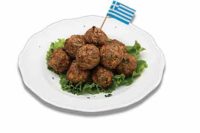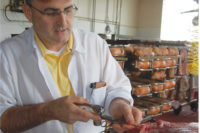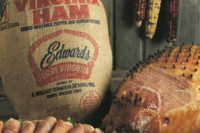Better-for-you Breakthroughs
RMH Foods returns as an independent processor with an eye toward new markets and emerging trends.















|
Now, once again on its own, RMH Foods is solidifying its reputation as one of the most innovative companies in the refrigerated fully cooked category.
“As an independent, we’re not looking to be the branded leader in the business,”says Jonathan Rocke, president and CEO of the Morton, Ill., company that his grandfather started in 1937. He notes his company’s strengths as developing and executing fully cooked entrees that fill a need in the marketplace without sacrificing taste. The company plans to work with more market partners to bring successful concepts to fruition.
“If they have a brand position and a sales-and-marketing system in place but need great manufacturing and an innovation partner, that’s how we can work together,”he says.
RMH Foods entered into the fully cooked category in the early 1990s, when a customer asked the company to produce a prime rib. Success in that venture launched the company into the then-fledgling fully cooked market.
RMH has been a long-time partner with a variety of retail stores, making it one of the largest private-label refrigerated entrée manufacturers, if not the largest. It has also proven that it can market its own products successfully as well, with its Milano’s Italian Grille, the first Italian line of fully cooked refrigerated entrees. The line includes Lasagna with Meat Sauce, Chicken Parmesan, Fettuccine Alfredo with Chicken, and Spaghetti with Meatballs.
Rocke says that in the case of the Milano’s brand, the company’s choice was to launch its own line of products rather than using an established brand.
“There are some major brands out there in the marketplace, but everyone has their own local Italian haunt where they like to go,”he explains. “That’s when we decided that we would create our own brand and make great food under it. The response has been great.”
One of RMH Foods’most recent endeavors, though, demonstrates Rocke’s vision of blending his company’s food-processing expertise with a known brand.
Winning with “Loser”
Rocke notes that in the frozen entrée category, nearly 40 percent of all items are marketed as “better for you,”thanks to the popularity of Lean Cuisine, Weight Watchers and other brands.
“‘Better for you’hasn’t existed so far in refrigerated,”he adds. “Refrigerated so far has been dominated by comfort food —pot roast, meat loaf, beef tips.”
RMH had originally developed a better-for-you line of products and was planning to market it under the Simply Sensible brand. Before the launch, however, the company instead entered into a partnership with Harris Food Group, which brought the idea to NBC as a tie-in to the network’s “The Biggest Loser”program.
“We decided that together, we had a great opportunity in the marketplace,”Rocke says. The Biggest Loser-branded dishes were introduced into the retail marketplace in January, and retail chains such as Publix, Kroger, Safeway and WalMart have since added them to store shelves.
Items in the new line include Lasagna, Beef Tips and Gravy with Brown Rice, Zing Chicken (an Asian-style entrée), Mediterranean-Style Chicken with Bowtie Pasta, and Pot Roast and Potatoes. The products have fewer than 250 calories per serving, and they are all endorsed by the American Heart Association and have the AHA check-mark on the package.
“It was something that needed to be addressed in our category,”Rocke says, pointing out that the theme behind “The Biggest Loser”is lifestyle change and not dieting. “That was what we had conceived of with the Simply Sensible brand.”
Developing a product that met a certain nutritional profile wasn’t the challenge, according to Rocke.
“The trick was making a product taste good, which people want to eat —and by the way, it meets the nutritional profile,”he says. “We always say that our product development doesn’t come from the technology side, it comes from the taste side.”
Back to independence
One of the most notable changes in RMH’s history took place in 2001, when the company was acquired by Smithfield Foods Inc. Jonathan Rocke recalls that there was a concern at the time about having consistent access to raw materials.
“Around that time, all the packers were coming into this category,”he says. “IBP was about to launch a brand, and Excel had a brand in the marketplace. All the people we bought raw materials from were kind of competitors to us in the category.”
Smithfield had just bought Packerland, making the company one of the largest beef processors in the country, as well as the largest pork processor. Smithfield also had a model for independent operating companies, which allowed RMH some autonomy while still being part of the Smithfield family. The Rocke family never left the company, as can happen when new owners acquire an established business.
Rocke calls the experience as a Smithfield company mutually beneficial at the onset. RMH Foods had an ample supply of raw material, and Smithfield had the goal of establishing and securing a branded position in the refrigerated entrée marketplace.
Over the years, though, the industry changed to where the arrangement between the two companies ceased to be as favorable as it was at the onset. In 2009, Smithfield made a decision to focus more on its core pork strategy and made plans to spin off RMH Foods. The Rocke family was able to gather a group of investors and buy back the business, leaving them an independent operator once again. Rocke points out that the two companies parted on friendly terms, and he hopes to continue the relationship with Smithfield into the future.
“I want them to be a customer of ours, and we want to be a customer of theirs,”he says. “That’s probably the best relationship we could have.”
Rocke adds that the response from the industry was positive, and the transition has allowed the company to take a different approach to the market.
“Underneath the corporate umbrella, often your priorities go to the corporation, whereas when you’re independent in our industry, our priorities now really focus on the customer and the food,”he says. “When you start doing that, it opens up a lot of opportunities.”
To Rocke’s point, the company’s customer base has broadened since his family reacquired the business.
Morphing production lines
When Rocke’s grandfather started the business in 1937, it was a custom butchering operation. The front end of the company’s original building was leased out in the 1950s to a supermarket. The Rocke family took that business over in the 1970s, creating Rocke’s Meating Haus, a specialty meat and deli operation.
RMH Foods closed its slaughter operations in 1984 to focus more on retail and foodservice distribution. When it started producing fully cooked products in 1991, the company applied its traditional minimalist process philosophy to the product, and it worked.
The quality of the end products speaks to the company’s production philosophy, and the company still adheres to it, says Jordan Rocke, Jonathan’s son and RMH’s production director.
“We believe [in leaving] the product in as much of its natural state as we can, using time and temperature to get the texture that we want,”he says.
Versatility is another hallmark of RMH Foods’production processes. The company has equipment to slice, dice or grind red meat and poultry products, and it can either use fully prepared sauces in its products or make them from a dry mix or concentrate.
“We’re a smaller company, and we know we need to be innovative and flexible to continue,”explains Rocke. “You never know what product we’re going to run next, so as we bring in our equipment or are looking at our facility, we’re definitely looking at what’s going to give us the most flexibility.
“We started off as a heavy pot roast and pork roast facility,”he continues. “Now, we also produce a lot of chicken items. My lines have had to morph as we’ve changed product offerings.”
The company’s present facility was completed in 2002, and its previous facility is now being used as a research & development lab. Jonathan Rocke points out that the company has room to expand if need be.
“While the economy has somewhat shifted people’s shopping habits, and fully cooked in some arenas has been softer than what it was in the previous decade, I think the trend toward convenience is just not going away,”he says.
The company’s three values are people, promises and possibilities. RMH Foods looks to continue producing convenient meal solutions so that families have more time to spend together and less time spent cooking. Naturally, the food has to taste good, and Rocke says that the end products have to be something that the employees would be proud to put on their own tables.
Looking into the future, Rocke says that the company will continue to bring both good taste and convenience to other areas of the food industry, such as the deli case and the foodservice sector. Some items are still in development, but the company believes it will solve the challenge of having a complete meal at the deli —not just the center-of-the-plate protein.
“We believe we have some food solutions that could work at the deli, but we wanted to understand what their issues were and bring them a true next-step solution,”he explains. “We think we found them the ability to bring a convenient meal opportunity with the family. We’re a couple of months away from actually having product in the marketplace, but we’re excited.”
Looking for a reprint of this article?
From high-res PDFs to custom plaques, order your copy today!














